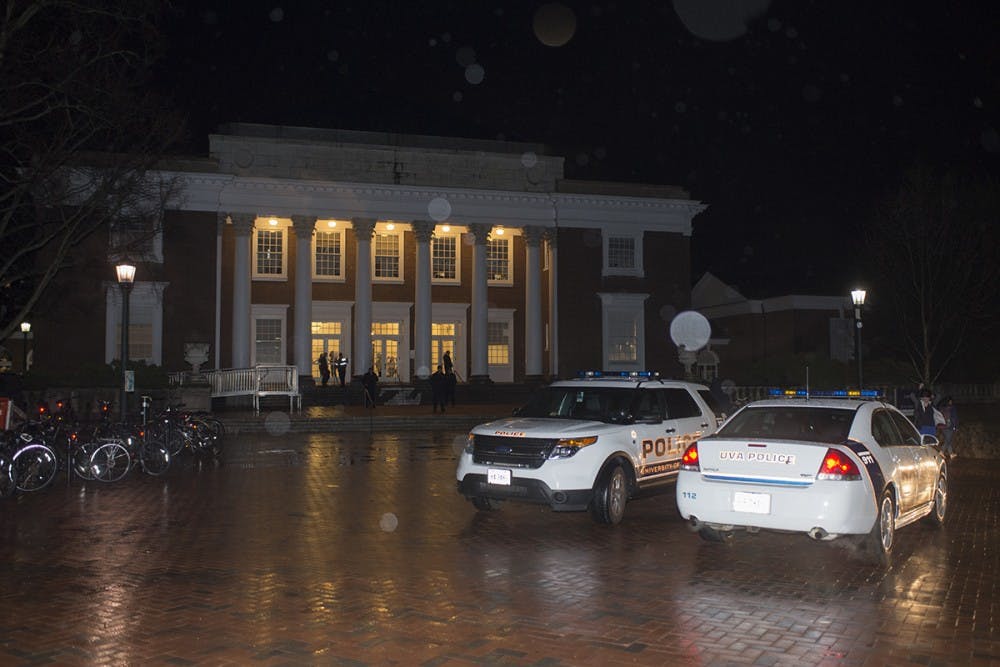On the night of Feb. 22, Pro-Palestinian protesters converged on Clark Hall to derail an event held by the Brody Jewish Center and Hoos for Israel. The event, featuring a panel of reservists from the Israeli Defense Force, sought to “promote conversation and respectful dialogue between students of different religious and political backgrounds,” according to Talia Sion, the chair of the Jewish Leadership Council on Grounds. The Pro-Palestinian protesters must have missed the memo about “respectful dialogue” because their threatening behavior — including derogatory posters and chants intended to shout down civil free speech — eventually led to the dispatch of the University Police Department. Students left the event fearing for their safety. This incident, along with the University’s Minority Rights Coalition’s rejection of the Jewish Leadership Council’s request for full admission into their organization, is a continuation of the trend I wrote about in a column published last July about the often hypocritical attitudes with which those seeking to represent minorities approach Judaism. Intersectionality — a principle purporting to protect minorities — has facilitated the discrimination against this historically and presently vulnerable minority group.
At its core, intersectionality postulates that several classic types of oppression have similar roots. Thus, forms of discrimination like racism, colonialism, sexism and transphobia are all deeply interconnected. It is under the guidance of this assumption that the MRC strives to rectify the University’s ingrained issues as they relate to a number of traditionally marginalized groups. The MRC seeks to provide support and advocacy for various constituent organizations across Grounds. Given this mission, the MRC’s failure to include JLC as a member of its body is all the more disappointing. The events of this past August brought the ugly face of anti-Semitism into sharp relief not only as it exists in the world, but as it exists within our University’s geography. Despite overt and unresolved displays of anti-Semitism on Grounds, the MRC refuses to acknowledge Jewish students as a viable minority. In line with the recent popular mantra of “anti-Zionism, not anti-Semitism,” the MRC justified the group’s exclusion by citing JLC’s association with Hoos for Israel. Somehow this constituted adequate grounds for rejection even when several constituent organizations of the MRC are aligned with the agendas of particular nations. For example, the Middle Eastern Leadership Council, which is associated with Students for Peace and Justice in Palestine, enjoys the benefit of MRC membership.
The problem with the MRC’s co-opting of intersectionality is its construction of a binary — a designated worthy minority and unworthy minority. This binary completely breaches the logic upon which minority advocacy groups are constructed and creates a framework in which the voices and experiences of select peoples are elevated while others are silenced. Moreover, the established criteria for selection and elevation typically amount to little more than subjective and often trivial reasoning. In its statement justifying the rejection of JLC from full membership status, the MRC cites the discomfort of particular students as a substantial explanation for the exclusion of an entire minority group. The irony of a group self-appointed to protect the rights of minority students at all costs — regardless of any discomfort that protection causes the mainstream majority — barring a vulnerable population from representation because of feelings of “concern” is too glaring to overlook.
Other would-be advocacy groups bolster this restrictive framework through their consistent discrimination against Jews under the guise of anti-Zionism. In addition to the many examples I referenced in my past column — including the Chicago Pride Parade’s eviction of a Jewish woman carrying a rainbow flag featuring the Star of David and UC Berkeley's anti-Jewish rhetoric during a Students of Color Conference — several more arise. In 2016, the platform of the Black Lives Matter movement denounced Israel as an “apartheid state” that had been “complicit in genocide.” This deliberate misunderstanding of Israel’s role in the Middle East’s delicate geopolitical network both evokes the painful history of the people who populate the Jewish state and, cruelly, shifts it against them, indirectly undermining the still festering wound of the Holocaust. In a 2017 interview with The Nation, an organizer of the International Women’s Strike movement’s “A Day without a Woman” asserted that identifying as a Zionist and identifying as a feminist are mutually exclusive, yet another attempt to deny Jewish entrance into minority rights conversations. While these activist groups fancy themselves experts on foreign policy when it comes to shaming Israel, they remain shockingly silent on appalling human rights violations elsewhere — including internally within Palestinian society.
In 2013, 27 Palestinian women suspected of sexual relations outside of marriage were murdered following pressure from Palestinian officials in so-called “Honor Killings.” Within Palestinian communities, violence against women reaches staggering percentages — with 53 percent of women reporting having experienced domestic or sexual violence in 2014. Both sides of the conflict have deeply flawed histories and politics — yet activist groups and academia choose to harp on the faults of arguably the most democratic society in the Middle East. With this reasoning, the intersectionality movement allows extreme hypocrisy in its inclusion of some marginalized groups and not others. In 2015 FBI research found that 54 percent of religiously motivated hate crimes targeted Jews. The exclusion of Jews from the center of intersectionality, given the nation’s current level of anti-Semitism, undercuts the interconnected roots of oppression, which are critical to eliminating abuse of minority rights — revealing the active failure of intersectionality to adequately fulfill its own definition.
Charlotte Lawson is an Opinion columnist for The Cavalier Daily. She can be reached at opinion@cavalierdaily.com.







